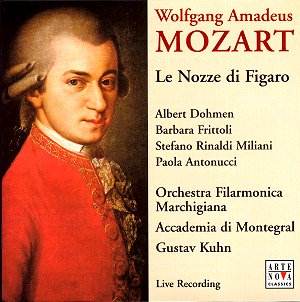Kuhn is an energetic conductor and a charismatic
personality, who throws himself wholeheartedly into whatever music
he is conducting. At Glyndebourne he gave fine performances of
operas by Richard Strauss in the 1980s, but he has never returned,
while at Covent Garden his star only briefly waxed and waned.
This recording may be, to quote Arte Nova’s hype, ‘a fresh and
stimulating Figaro’ but, apart from Frittoli, it is certainly
not ‘a cast of the highest international quality’. The highs and
lows of a live performance are up for discussion as usual, too
much applause between numbers, too much orchestral tuning, poor
balance between parts of the stage and the pit (when singers are
upstage), and within vocal ensembles onstage (such as too much
of the Count and Curzio in the third act Sextet). There is also
a lot of intrusive stage noise which you might not notice in the
theatre, but you do when deprived of the visual experience. Of
course this is not a live performance, but a synthesis of four
live performances, so, if parts within a single performance are
unusable (and there is no shame in that), why not record it in
a studio?
One questions the wisdom of an uncut Figaro,
for while the Marcellina aria is a good piece of music (and the
addition of the fortepiano colours its string-only accompaniment
nicely), Don Curzio’s immediately thereafter is very weak, and
frankly Mozart should not have bothered to impede the momentum
of the action as the opera draws to a close. Kuhn’s tempi are
generally orthodox but for deadly slow arias for the Countess
(the second mercifully perks up at the Allegro ‘Ah se almen, la
mia costanza’), and a rushed chorus in act three (‘Ricevete, oh
padroncina’), which comes in exactly at a breathless one minute).
Despite these fairly serious reservations, there’s
much to enjoy, in particular the way Don Curzio kick-starts his
stammer in the third act. I’ve not heard it done quite like that
before.
Christopher Fifield
